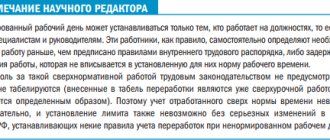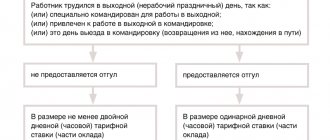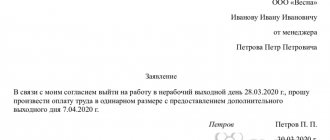How is an irregular working day defined in the Labor Code of the Russian Federation?
An irregular working day according to the Labor Code of the Russian Federation (hereinafter referred to as NSD) means a work regime in which an employee can be involved in work beyond the standard working hours established for all employees (Article 101 of the Labor Code of the Russian Federation).
The main features of this work mode are as follows:
- The NSD must be established for a specific employee, and the possibility of its establishment must be pre-established in the internal regulations of the enterprise;
- when establishing the NSD, this must be stipulated in the employment contracts for each employee involved;
- involvement in work beyond normal working hours must be episodic in nature and must be determined by production needs;
- the types of work performed during extra time should only be the same as those performed as usual and provided for by the employment contract, job description and other similar documents;
- Working additional time for employees in the NSD mode on weekdays is not considered overtime work;
- the establishment of NSD has restrictions provided for by law in relation to persons who are provided with additional social and state support: minors;
- pregnant women;
- disabled people;
- single parents of small children.
What to put on your timesheet if you have irregular working hours?
As of: 12/10/2010 Magazine: Everything for the personnel officer Year: 2011 Author: Batura Anna Vladimirovna Topic: Documents of the personnel service, Irregular working hours Category: Is there a problem? Here's the solution
- Document templates
- Time sheet Journal
Regulations
Labor Code of the Russian Federation (extract)
Articles
- All work books were burned. What to do?! Providing leave strictly according to schedule Employer branding – a new fashion or the future of HR?
Last month we changed our chief accountant. And everything would be fine - he establishes contact with the HR department and organizes work. But on some issues we cannot come to a consensus. Here, for example, is such a problem. Our company has employees who work irregular working hours. For this, as expected, we provide them with additional leave. Such employees were always given “eights” on their timesheets. And the new chief accountant claims that the days when they overwork must be recorded in the timesheet, because we are obliged to keep accurate records of the time worked by each employee. Have we been doing it wrong all along?
Irregular working hours are a special mode of work in which employees, by order of the employer, are occasionally involved in work outside the normal working hours.
Compensation for this mode of work is not increased wages, but annual additional paid leave of a certain duration, but not less than three calendar days.
The question of how to record work during irregular working hours raises many problems in practice. On the one hand, the employer does have an obligation to keep accurate records of the time actually worked by each employee. The Labor Code of the Russian Federation directly speaks about this (Part 4 of Article 91 of the Labor Code of the Russian Federation). Your chief accountant is absolutely right about this.
On the other hand, such overtime, unlike, for example, overtime work, employees are not paid. In this regard, the question arises: how to simultaneously fulfill your responsibilities for recording time worked and not get confused about payment? Let's get a look.
So, for those who work irregular working hours, the number and duration of overtime in excess of established working hours does not affect the amount of wages and the duration of their additional leave.
Recording working time allows you to control labor discipline, monitor the presence of workers at work, and, if necessary, resolve the issue of the place and time of any incidents, for example industrial accidents, etc. Also, accurate recording of working time will allow the employer to prevent violations of labor legislation in the form of systematically involving an employee in performing labor functions beyond the established working hours. As we have already noted, long working hours are episodic work and should not turn into a system of overtime.
As a general rule, a time sheet is used to record the working time worked by each employee. It has a unified form No. T-12 or No. T-13, approved. Resolution of the State Statistics Committee of Russia dated 01/05/2004 No. 1 “On approval of unified forms of primary accounting documentation for recording labor and its payment” (hereinafter referred to as Resolution of the State Statistics Committee of Russia dated 01/05/2004 No. 1).
The purpose of this document is defined in the Guidelines for the use and completion of forms of primary accounting documentation, approved. Resolution of the State Statistics Committee of Russia dated January 5, 2004 No. 1.
Time sheets are drawn up in one copy by an authorized person, signed by the head of the structural unit, an employee of the personnel department, and then transferred to the accounting department for payroll calculation. Thus, the amount of the employee’s remuneration will depend on the length of working hours recorded in this document. And we have already found out that working irregular hours does not affect wages.
Our information
If an irregular working day is established for an employee, keeping records of the time actually worked by him outside the established working hours is not necessary in order to “justify” the provision of additional paid leave to the employee. Unfortunately, this opinion is sometimes found even among inspectors from the State Tax Inspectorate, but it is wrong.
Additional paid leave is provided to employees for whom irregular working hours are established for the very possibility of their occasional involvement in work outside the established working hours. An employee's entitlement to such leave is completely independent of how many times and for how long they stayed off work during the year for which the leave is granted. Such paid vacation days must be provided to employees whose positions are included in the list of employees with irregular working hours, even if during the year they never carried out instructions from management outside the normal duration of their working hours.
The presence and duration of overtime do not affect the duration of the additional paid leave provided. The number of calendar days is fixed in the local regulations of the employer or in the collective agreement, and is also necessarily indicated in the employment contracts of employees.
YOU SHOULD KNOW THIS
A time sheet is a document the basis for calculating wages to an employee
The time sheet reflects the time spent working in conditions that deviate from normal conditions when this is associated with additional pay. Thus, the timesheet takes into account hours of overtime work, night work, work on weekends and non-working holidays.
But to fulfill the obligation provided for in Part 3 of Art. 91 of the Labor Code of the Russian Federation, it is possible not only with the help of a working time sheet. When an employee works irregular working hours, occasional overtime must be taken into account in any other way that the employer chooses. For such accounting, you can keep, for example, a log of working hours worked by employees during irregular working hours. Let's look at an example.
EXAMPLE
For HR inspector A.P. Gavrilova, a regime of irregular working hours has been established, which is compensated by four calendar days of annual additional paid leave.
By order of the head of the organization, the HR inspector carried out an urgent assignment outside of her working day on January 17, 2011. To prepare for the audit, she was involved in overtime work on January 28, 2011, with written consent.
In the working time sheet, the top line is used to mark the symbols (codes) of working time costs, and the bottom line is used to record the duration of time worked (in hours, minutes) according to the corresponding codes of working time costs for each date.
On January 28, overtime work was recorded in the accounting report card (working time on that day was 10 hours), while overtime during irregular working hours on January 7, 201 1 was not noted in any way in the report card. Example 1
).
Moreover, the duration of work on behalf of the manager on the specified day is recorded in a special journal ( example 2
).
Summary
Accounting for overtime during irregular working hours should not be kept in the working time sheet (unified forms No. T-12 and T-13), since they are not paid. Accounting should be kept in a separate document.
Thus, “eights” are entered on the timesheet for employees working irregular working hours without indicating the overtime. In this case, processing time must be taken into account using other accounting forms.
EXAMPLE 1
Time sheet ( fragment
)
EXAMPLE 2
Journal of working hours worked by employees during irregular working hours
How is a non-standard operating mode established?
Establishing NSD for certain categories of employees includes several mandatory steps:
- A list of positions at the enterprise for which NSD is expected is developed and approved. There is no specific list in the legislation, so employers need to do this themselves, based on the specifics of the activity and the functionality of the positions. According to statistics, the following positions and professions top the list:
- senior management representatives;
- employees whose work schedule is related to the work of management: assistants, secretaries, clerks, personal drivers, translators;
- heads of accounting and financial services;
- heads of departments with atypical work schedules (for example, warehouse or equipment adjusters department);
- technicians and adjusters;
- technologists (especially in continuous cycle industries);
- logisticians and dispatchers;
- workers responsible for safety and security.
- A draft internal regulatory act is being drawn up to establish the NSD for the categories of workers included in the list.
- If the enterprise has a representative body of workers, the draft local act must be submitted to it for approval. The procedure is provided for in Art. 8 and 372 of the Labor Code of the Russian Federation.
For more information on approvals with the body representing the interests of employees, see “Art. 372 of the Labor Code of the Russian Federation: questions and answers.”
- The draft normative act agreed upon with the stakeholders is approved and becomes the internal regulations of the organization. All employees must be familiar with it against signature.
- For already working employees, when establishing NSD, additional agreements are made to their employment contracts. For newly hired employees, the established NSD is immediately included in the contract, job description and admission order. The new regulations are also reflected in the collective agreement of the enterprise with its employees.
Documentation of conditions with irregular working hours 2022
When hiring an employee, it is necessary to familiarize him with the collective agreement, internal labor regulations and other local regulations in force in the organization and relating to his labor function. After this, an employment contract is concluded with the employee, which includes a condition for working on irregular working hours. By signing it, the employee agrees with the nature of the work, which involves overtime.
Sample employment contract
This condition must also be indicated in the employment order.
Sample order
It is worth noting that if an employment contract has been concluded with an employee for a position that is not in the approved list of professions with irregular working hours, then this condition is unlawful. Consequently, the employee has the right to refuse to work beyond the working hours and on this basis he cannot be brought to disciplinary liability.
If an employee is transferred to a position for which irregular working hours are established, then the employer should:
- familiarize him with local regulations containing a list of positions with irregular working hours;
- conclude an additional agreement to the employment contract to include conditions for irregular working hours and compensation for this type of work;
- issue an appropriate order (in free form).
If the employee’s condition on irregular working hours is excluded, then the employer must enter into an additional agreement with him, which will contain a different work schedule, and issue a corresponding order.
What are the nuances of applying such a labor regime in practice?
The NSD regime contains a number of obvious advantages for the employer:
- Working beyond the norm under NWP is not considered overtime. This means, among other things, that:
- There is no need to document every employee’s delay at work as required by Art. 99 Labor Code, - with a separate order for each case, written consent of the employee, etc.;
- there is no need to pay for processing at increased rates according to Art. 152 TK.
- NSD makes it possible to simplify the recording of working time for the relevant categories of employees, since:
- there is no need to follow the processing limits allowed under Art. 99 TK;
- compensation for non-working hours does not depend on the number of overtime hours, so there is no need to keep separate special records for them to calculate compensation (the number of hours actually worked in the usual manner is entered into the timesheet).
At the same time, NSD provides for a number of mandatory compensation provisions for employees on the part of the employer:
- Establishing monetary compensation (for example, a salary increase) for NSD. It is worth noting here that such a bonus must be paid in any case, regardless of whether the employee had actual overtime under the NSD in the billing period (month) or not.
- Establishment of additional days of annual paid leave. According to Art. 119 of the Labor Code there must be at least 3 of them, but by collective agreement there may be more. Here the rule is the same as when calculating wages: additional leave is granted if, according to the terms of the contract, an NSD employee has, even if in fact he worked according to the general regular schedule.
- The NSD regime does not apply to work on weekends and holidays. According to the norms of Art. 111 and 113 of the Labor Code, weekends and holidays are established for all workers, therefore the rules for attracting work and payment for it at this time are regulated separately.
Read more about labor holidays and weekends here: “Art. 113 Labor Code of the Russian Federation: questions and answers.”
IMPORTANT! If the establishment of NWP for an employee is not properly formalized and/or the compensatory measures proposed by the Labor Code are not carried out in relation to him, then any actual overtime must be documented and compensated as overtime work .
Find out, “How is overtime paid under the Labor Code of the Russian Federation?”
Time sheet and calculation of wages T-12
This document form is filled out manually, regardless of whether the forms are printed or stored electronically. In the latter case, the completed form is printed and signed by the responsible person to transfer the data to the accounting department. T-12 has two independent sections. As the name suggests, one of them is designed to record the hours worked by an employee, the other is for calculating payment for working hours. The Resolution of the State Statistics Committee stipulates that the organization has the right to use only the first section of the T-12 form, since it is an independent reporting document. Section two is filled out by the accounting department. In turn, accounting can use other approved forms or programs to calculate wages.
The main table of the T-12 report card consists of 55 positions. The document takes into account as much as possible the details of the working period for accurate salary calculations.
How and by how many hours can a standard working day be extended?
In this aspect, almost everything remains at the discretion of the employer. There are no special regulatory standards established by labor legislation, therefore:
- You can be involved in additional work for NSD both before and after the official working day.
- An instruction to stay late (or arrive early) can be issued in any form, including verbally, and the employee’s separate consent is not required.
- The time spent on overtime during NSD is not limited in any way; the employee works as many hours as required to complete the assigned task. The only condition: processing should not be done every day for a long time.
NTVP "Kedr - Consultant"
LLC "NTVP "Kedr - Consultant" » Services » Legal consultations » Labor disputes » Is it possible to establish an irregular working day with a summarized accounting of working hours?
Question
Is it possible to establish an irregular working day when recording working hours together?
Lawyer's answer
The employer has the right to establish for the employee for whom summarized working hours are kept a working time schedule in the form of an irregular working day.
The current labor legislation does not contain a prohibition on establishing an irregular working day for an employee for whom summarized working time recording has been introduced.
In accordance with Art. 100 of the Labor Code of the Russian Federation, the working time regime must provide for the length of the working week, work with irregular working hours for certain categories of workers, the duration of daily work (shift), including part-time work (shift), start and end times of work, time of breaks in work , number of shifts per day, alternation of working and non-working days, which are established by internal labor regulations in accordance with labor legislation and other regulatory legal acts containing labor law norms, collective agreements, agreements, and for employees whose working hours differ from the general rules established by a given employer - an employment contract.
Irregular working hours are a special work regime, according to which individual employees may, by order of the employer, if necessary, be occasionally involved in the performance of their labor functions outside the established working hours (Article 101 of the Labor Code of the Russian Federation). At the same time, it is possible to attract employees to perform their labor functions both before the start of the working day (shift) and after the end of the working day (shift).
The list of positions of employees with irregular working hours is established by a collective agreement, agreements or local regulations adopted taking into account the opinion of the representative body of employees (Article 101 of the Labor Code of the Russian Federation).
It should be noted that the involvement of workers outside the established working hours should not be systematic, but should occur from time to time (episodic) and in certain cases (Letter of Rostrud dated 06/07/2008 N 1316-6-1 ).
According to Part 4 of Art. 91 of the Labor Code of the Russian Federation, the employer is obliged to keep records of the time actually worked by each employee.
Normal working hours cannot exceed 40 hours per week (Part 2 of Article 91 of the Labor Code of the Russian Federation).
When, due to production (work) conditions, the daily or weekly working hours established for a given category of workers cannot be observed, Art. 104 of the Labor Code of the Russian Federation allows for the introduction of summarized recording of working time so that the duration of working time during the accounting period does not exceed the normal number of working hours. The normal number of working hours for the accounting period is determined based on the weekly working hours established for this category of workers (Part 3 of Article 104 of the Labor Code of the Russian Federation). Consequently, when recording working hours in aggregate, overtime overtime in excess of the normal working day on one day is compensated by additional rest time on another day in the same accounting period.
Moreover, even when establishing summarized accounting for the employee in accordance with Art. 100 of the Labor Code of the Russian Federation, a certain operating mode must always be established, that is, the duration of its working week, the duration of daily work (shift), the start and end time of work, the time of breaks in work, etc.
Consequently, if the employer needs to involve an employee, for whom a summary record of working time is kept, in the performance of labor duties outside the normal working hours, it is possible to establish a working time regime in the form of an irregular working day.
{Question: ...The local regulatory act of the organization has approved a list of positions for employees with irregular working hours. Since January 2016, summarized recording of working time with a “year” accounting period has been introduced and a shift work schedule has been established. Does an employer have the right to establish an irregular working day for an employee with a cumulative accounting of working hours? (Expert Consultation, 2016) {ConsultantPlus}}
The explanation was given by Igor Borisovich Makshakov, legal consultant of LLC NTVP Kedr-Consultant, March 2018.
When preparing the answer, SPS ConsultantPlus was used.
This clarification is not official and does not entail legal consequences; it is provided in accordance with the Regulations of the CONSULTATION LINE ().
How to record the transition to an irregular day in an employment contract - sample
If the regulation on NSD is already in force at the enterprise, information about this is entered in advance into draft employment contracts with new employees who will work on NSD terms (according to the norms of Article 57 of the Labor Code of the Russian Federation).
Read more about the content of employment contracts here: “Art. 57 of the Labor Code of the Russian Federation: questions and answers.”
As an example, consider a situation where NSD is an innovation for employees with whom there are existing contracts.
Example
Transit-logistic LLC is engaged in the storage and sorting of cargo for air transportation. In connection with the increase in activity volumes and the acquisition of new warehouse space, the LLC is introducing a new work schedule for warehouse employees and irregular working hours for department heads. In this regard, the LLC makes changes to the employment contract with the head of the sorting department, A. A. Pryakhin.
Please note: 2 clauses of the contract have been changed. Directly related to work hours and establishing standard work schedules. The work schedule clause is a direct adherence to the norms of Art. 101 of the Labor Code, which establishes that non-working hours are periodic involvement in work beyond the established working hours. Therefore, in order to prescribe the NSD in the contract, it is necessary to determine the established “regular” working hours.
It should also be noted that the agreement must indicate the date from which the changes become effective. Changes cannot take effect retroactively. All employee overtime that occurred before the appointment of the NSD must be accounted for as overtime and paid accordingly.
List of positions
The employer has the right to determine the list of employee positions for which irregular working hours may be established independently, fixing it in a collective agreement, agreement or local regulation adopted taking into account the opinion of a trade union, if there is one. This is stated in Article 101 of the Labor Code of the Russian Federation. Thus, the list of positions can be fixed, for example, in the Regulations on Irregular Working Days or formalized as an appendix to the Labor Regulations. Examples of the execution of local acts on approval of the list can be the order of the Federal Social Insurance Fund of Russia dated June 22, 2009 No. 146 and the resolution of the Board of the Pension Fund of the Russian Federation dated November 1, 2007 No. 274p.
When establishing irregular working hours, in addition to checking for compliance with the list of positions, it is necessary to take into account the nature of the work of individual groups of employees. In particular, it is impossible to establish an irregular working day:
- disabled people of group I or II;
- external or internal part-time workers.
At the same time, working part-time is not an obstacle to establishing an irregular working day for an employee.
Situation: is it possible to establish an irregular working day for a disabled person of group I or II?
No you can not.
Formally, the Labor Code of the Russian Federation and Law No. 181-FZ of November 24, 1995 do not directly prohibit the establishment of irregular working hours for disabled people.
At the same time, such categories of employees are entitled to reduced working hours, which indicates a limitation on the establishment of irregular working hours for disabled people of group I or II (Articles 92, 94, 101 of the Labor Code of the Russian Federation, Article 23 of the Law of November 24, 1995 No. 181- Federal Law).
Taking into account the above, in order to avoid disputes and litigation, it is not recommended to involve employees with disabilities of group I or II to work on irregular working hours.
Situation: is it possible for a part-time worker to have irregular working hours?
No you can not.
Part-time work is doing other work in your free time from your main job. The duration of working hours for such work should not exceed four hours a day (Articles 60.1, 282, 284 of the Labor Code of the Russian Federation).
Irregular working hours are a special work regime, according to which individual employees may be involved in performing their labor functions outside the established working hours, subject to a number of conditions (Article 101 of the Labor Code of the Russian Federation).
Since the length of a part-time worker’s working hours is limited by law, he cannot be assigned an irregular working day, regardless of how many hours a day the part-time worker works.
Situation: is it possible for an employee who works part-time to have irregular working hours?
Yes, you can.
Part-time working hours can be established for an employee by agreement between the parties to the employment contract (Article 93 of the Labor Code of the Russian Federation). The introduction of an irregular working day means that an employee performs work duties outside the working hours established for him, including outside part-time working hours (day or shift) (Article 101 of the Labor Code of the Russian Federation). Thus, for an employee who works part-time, the employer has the right to establish an irregular working day. The legitimacy of this approach is confirmed by Rostrud in a letter dated April 19, 2010 No. 1073-6-1.
For working irregular working hours, employees are entitled to compensation in the form of annual additional paid leave. The duration of such leave must be at least three calendar days, regardless of whether the employee works full-time or part-time. This follows from the provisions of Article 119 of the Labor Code of the Russian Federation.









